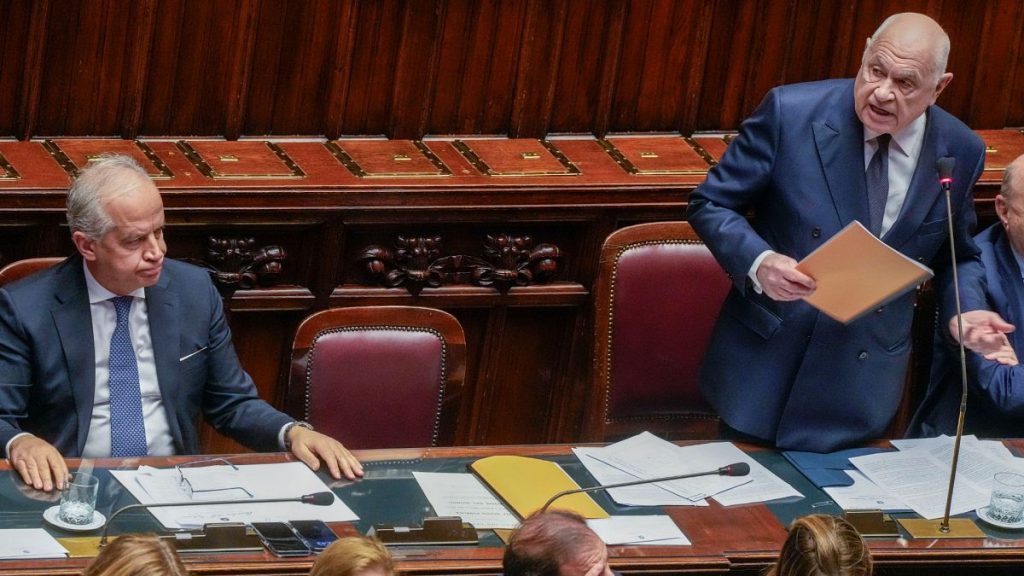Summarize this content to 2000 words in 6 paragraphs in Arabic
Carlo Nordio argued that the ICC’s arrest warrant contained contradictions and procedural flaws, leading Italy’s courts to order Ossama al-Masri’s release.
ADVERTISEMENTItaly’s justice minister vigorously defended the government’s decision to repatriate a Libyan warlord wanted by the International Criminal Court (ICC), arguing on Wednesday that the court itself had made an “immense mess” of the case with an inconsistent and flawed arrest warrant.Carlo Nordio told the lower house of the Italian parliament that he had acted cautiously regarding the 18 January warrant against Ossama Anjiem, also known as Ossama al-Masri, who is accused of war crimes and crimes against humanity.Nordio said the Hague-based court had later “corrected, or rather completely overturned, the previous warrant” by amending the timeframe of al-Masri’s alleged offences.“The court itself detected the errors and attempted to amend them five days later, because it realised that an immense mess was made,” Nordio told his colleagues.The Italian government has faced sharp criticism from the ICC, human rights organisations, and opposition politicians for releasing al-Masri from detention on 21 January and deporting him to Libya on an Italian military aircraft.Al-Masri was detained in Turin on 19 January, a day after arriving from Germany to watch a football match. He heads the Tripoli branch of the Reform and Rehabilitation Institution, a network of detention centres controlled by the government-backed Special Defence Force.The ICC warrant, published on the court’s website, accuses al-Masri of war crimes and crimes against humanity committed at Mitiga prison in Libya from 2015 onwards, including murder, torture, rape, and sexual violence — offences that carry a life sentence.However, the Italian government insists that Rome’s court of appeal ordered his release due to a technical issue in how the ICC warrant was transmitted, as it initially bypassed the Italian justice ministry.Nordio reiterated this argument, stating he had only received an “informal email of a few lines” from Interpol three hours after al-Masri’s arrest. He also pointed to contradictions in the original warrant, which initially stated the crimes occurred between 2015 and 2024, but in its conclusions, referred to offences committed from “2011 onwards”.“An irreconcilable contradiction emerges regarding an essential element of the arrestee’s criminal conduct, regarding the time of the crime committed,” Nordio added.However, when the ICC publicly unsealed the warrant on 24 January, it issued an amended version to “correct certain typographical and clerical errors”. The updated document confirmed the timeframe as 2015-2024.Accusations of breaching ICC obligationsHuman rights groups have condemned Italy’s decision to repatriate al-Masri, calling it a major violation of its responsibilities as a founding member of the ICC.Under Article 89 of the Rome Statute, the treaty that established the court in 1998, signatories are obligated to comply with arrest and surrender requests.Opposition lawmakers have seized on the controversy to criticise Prime Minister Giorgia Meloni, demanding she personally address parliament on the matter. During Wednesday’s session, they held up placards reading: “Meloni, patriot at large”.Italy has strong ties with Libya’s internationally recognised government, whose help it relies on to curb migration across the Mediterranean from the North African coast.ADVERTISEMENTCritics have accused Meloni’s government of capitulating to pressure from Libyan militias, allegedly out of fears that had al-Masri been handed over to the ICC, they would retaliate by increasing the number of migrant boats sent towards Italy.However, Interior Minister Matteo Piantedosi, who also addressed parliament on Wednesday, dismissed any suggestion that al-Masri had acted as a government intermediary on migration issues. He also denied that Italy had received threats in connection with his arrest. Opposition leader Elly Schlein of the Democratic Party sharply criticised Nordio’s defence, arguing that his legal justifications for dismissing the ICC warrant were misplaced.“Minister Nordio, you didn’t speak to this chamber as a minister, but as the defence lawyer of a torturer,” Schlein said.ADVERTISEMENTNordio’s critique of the ICC aligns with the government’s broader attempt to shift focus onto the judiciary’s handling of the case. Last week, Rome’s chief prosecutor informed Meloni, Nordio, Piantedosi, and another senior official that they were under investigation for allegedly facilitating irregular migration by repatriating al-Masri.Meloni has spent days denouncing what she describes as political interference from Italy’s judiciary and defending the government’s decision, framing it as a matter of national security.“When the security of the nation and the interests of Italians are in play, there is no room for backing down,” she wrote on X on 29 January.
rewrite this title in Arabic Italy’s justice minister defends repatriation of Libyan warlord wanted by ICC
مقالات ذات صلة
مال واعمال
مواضيع رائجة
النشرة البريدية
اشترك للحصول على اخر الأخبار لحظة بلحظة الى بريدك الإلكتروني.
© 2025 جلوب تايم لاين. جميع الحقوق محفوظة.


